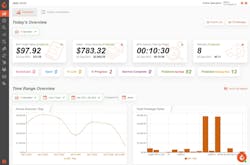Ask Jason Berry, co-owner of Havoline xpress lube locations in Cullman and Hartselle, Alabama, about his approach to running a quick lube, and he’ll likely tell you the success of the stores he operates with his wife, Crystal, comes not from focusing exclusively on profits, but on serving people and building a reputation for reliability and care.
Berry does monitor key performance indicators, but many of the metrics he’s tracking are in service of addressing the human side of the business.
“We’re not trying to upsell customers,” says Berry, the 2021 NOLN Operator of the Year. “That’s one big thing we’ve always done differently. I look at that car count more than that ticket average. I’m not here to try to run your price up, and maybe I’ll get you one or two more times. From now on, I want you to feel comfortable coming here.”
Not only does Berry want customers to feel comfortable coming to his stores, but also coming back after they’ve tried other quick lube shops. Berry’s businesses have faced increasing competition, both from other operators seeking to buy out his stores as well as aggressive marketing from a new, nearby rival offering heavy discounts. While many customers initially left for cheaper services, Berry remained optimistic, viewing the situation as an opportunity for self-improvement. Most of those customers eventually returned.
“We had a lot of customers that went there because of (the discounts offered),” he says. “Part of me could be mad about it, but I kind of took the approach that maybe they go and see something that we could better ourselves at if they come back to us. I just try to be open-minded and positive about it.
“Lo and behold, most customers’ feedback has been, ‘We’re sorry we cheated on you. We’ll never do it again.’”
One tool Berry has implemented recently to make sure his customers are satisfied is a messaging platform where they can share thoughts on the service they have received.
“I'm getting almost instant feedback from my customers,” he says. “You know, how did we do? What can we do to change? Those are just some of the KPIs that I really try to focus on, because like I say, it's the longevity that that I'm looking for and to have those repeat customers.”
For many operators in the industry, though, immediate feedback is only the tip of the iceberg in terms of what sophisticated data-collecting tools can offer.
Diving Deep with Data
Seven years ago, Vasilios Karagiannis and two colleagues founded Droptop, an oil change and vehicle maintenance software development firm based in Bradford, Ontario, Canada. Droptop’s software solutions help operators with invoicing, customer management, and inventory tracking so they can operate more efficiently and improve customer service. There are a few mistakes Droptop sees shop owners making frequently that the firm has tried to help with, Karagiannis says.
“The biggest mistake, by far, is operators just don't track enough,” Karagiannis says. “A lot of operators, especially smaller operators, they just look at their sales number, they look at their bottom-line expense at the end of the day, and that's it. There’s not a lot you can do to improve your business when you're looking at just (that high-level) KPI.”
For operators who want to do a deeper dive into their data, taking a closer look at inventory is a good place to start.
“There’s a big possibility you’re missing sales because you don’t have the right stock on the shelf. Secondly—and this is probably the bigger one that happens—you have a ton of money sitting on your shelf because you don’t realize you’re way overstocked and don’t need thousands of dollars’ worth of filters or whatever products you have sitting there.”
The biggest evolution in data tracking for quick lubes within the past five years isn’t the creation of new KPIs, but rather, developing new, easier ways to access existing data, Karagiannis says.
“I'd say the biggest differentiator now at least is you can track everything from anywhere, all in real time and from your phone,” Karagiannis says. “You have access to the same KPIs. Five or six years ago, you had to pull a report the day after to see the information. Now I can pull up my phone and see exactly what all my 10 stores are doing in real time and know what's happening.”
Looking Ahead
Karagiannis says he doesn’t expect the KPIs being monitored in the next five to 10 years to change much. The next big evolution could come from how shop owners take their data and put it into action to improve their operations.
“I think what's going to change a lot, though, is how we all start to leverage AI inside these systems,” he says. “The best way to look at it is today we go in, we pull a report, we dig through all the data, and we generate some sort of insight. Based on that insight, we're going to go and take some sort of action and that's all done by humans.”
Artificial intelligence will reshape that process, he says.
“The days of running a report are going to go away soon in the next couple of years. Now, if I want to know how a certain campaign is running—a coupon (for example)—I have to run a coupon report. (With AI), I should be able to say, ‘How is campaign 17 working in my East market?’, and AI will look at it and tell me here’s how it’s working. It will become a conversational tool where I just ask a question, and it gives me the data rather than pulling a report.”
As AI systems become more sophisticated further down the line, they will be able to not only provide insights but take actions based on their findings in the numbers, Karagiannis says.
“Today, the old way of doing this would be, ‘OK, I ran my report for last week, and I saw that on Friday, my labor percentage was too high and I need to adjust my next week's schedule because I had way too many guys staffed based on my car count on a Friday afternoon,” Karagiannis explains. “I'd run the report, generate the insight that something was wrong there, and then I'd go manually take the action to adjust next week's schedule.
“Eventually, what should start to happen is when I log in Monday morning, the AI has already like gone through and ran all those reports and figured all the data. I come in and see a little insight that says, ‘Hey, FYI, last Friday the labor percentage was way off. I recommend to you that we staff it differently. Here's what I recommend. Click here and I'll do it.’ That's where I see things going, whether it's five years or 10 years. I don't, I don't know quite yet, but I know we can get there.”
Trusting Your Team
Still, even the most sophisticated data platforms need to be complemented by good, old-fashioned people skills. For quick lube owners, that means interacting both with customers and employees.
By his own admission, Berry “used to be a horrible micromanager,” but he’s learning to adapt and put more trust in his store managers.
“I’m allowing the management at both locations to run their shops as if it was theirs,” he says. “It’s been good. They’ve been doing an exceptional job.”
At each of his two locations, Berry has designated a manager to oversee inventory. Berry meets with those managers weekly to discuss whether any adjustments need to be made to orders. He has also tapped store managers for the responsibilities of running pits and handling customer concerns.
Delegating responsibilities and developing management teams at each location has had a significant, positive impact on operations overall, Berry says.
“One hundred percent, there’s no question,” he says.
About the Author
Tom Valentino
Editor
Tom Valentino is the editor of National Oil and Lube News. A graduate of Ohio University, he has more than two decades of experience in newspapers, public relations and trade magazines, covering everything from high school sports to behavioral health care. Tom’s first vehicle was a 1990 Mazda 626, which he used to deliver pizzas in the summer after graduating high school. Today, he drives a 2019 Jeep Compass, which usually has a trunk full of his daughter’s sports gear. In his spare time, Tom is an avid Cleveland sports fan and a volunteer youth sports coach.
Don't miss Tom Valentino's next article. Sign up for NOLN's Quick Lube Report and This Month in NOLN newsletters.



